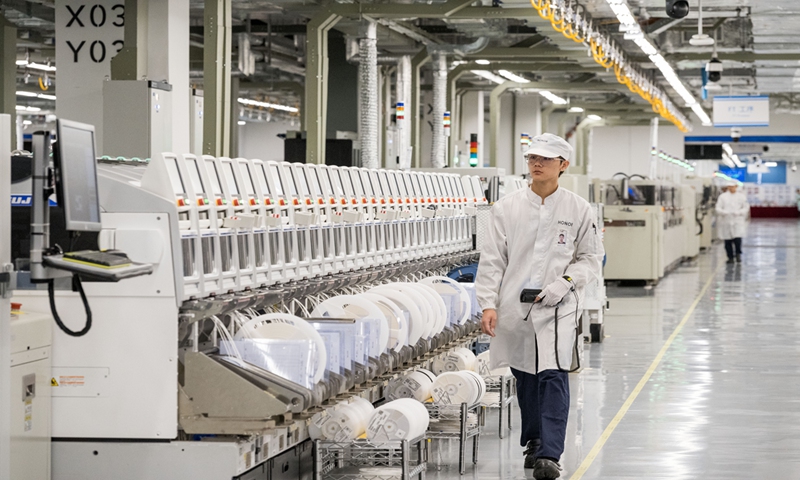Innovation to support development of modern industrial system
Along the 149-meter-long production line, there are only 24 workers, as 75 percent of the work is done by automated equipment, and it only takes 28.5 seconds to produce a mobile phone.
Such a busy but intelligent work site is also seen in a logistics department under the China Duty Free Group in Qianhai and Shekou Area of the China (Guangdong) Pilot Free Trade Zone in Shenzhen.
The smart assembly line system sorts more than 10,000 parcels daily with the help of smart technology, and the number can be even higher at peak shopping times such as the Double 11 shopping gala.
The efficient production and the exponential growth put on vivid display the quintessential “Shenzhen speed,” which refers to the rapid transformation of the city from a fishing village to a world-class metropolis in just a few decades.
It also mirrors China’s progress of technological prowess as sci-tech innovation has played a decisive role in promoting China’s high-quality development and modernization drive amid the shadows of decoupling drive advocated by some Western countries.
As the home of many technology companies such as electric vehicle manufacturer BYD, tech giant Huawei Technologies and dronemaker DJI, Shenzhen is regarded as the window of technology innovation of China.
The total added value of strategic emerging industries in 2022 was 1.33 trillion yuan ($187 billion), an increase of 7 percent over the previous year, accounting for 41.1 percent of the regional GDP, according to the local government’s annual report.
The rise of Shenzhen was driven by reform and opening-up, which attracted capital, technology and talent, and inspired the courage to innovate, Liu Dingding, a Beijing-based technology analyst, told the Global Times on Tuesday.
“It was reform and opening-up that gave birth to BYD, and it was a new development philosophy that unleashed huge opportunities and strengthened BYD,” said the company, which started its business 28 years ago in Shenzhen.
The company cited as an example that Shenzhen released a plan to optimize the market-oriented business environment in August, which further enhanced its business confidence.
After 28 years of development, the company has grown into an international enterprise with coordinated development across the four major industries of automobiles, rail transit, new energy and electronics. Its sales of new-energy vehicles encompass 58 countries and regions around the world.

People take pictures at Lianhuashan Park in Shenzhen, South China’s Guangdong Province on December 16, 2023. Photo: Chen Tao/GT
Underlining the role of scientific and technological innovation in promoting the high-quality development of China, the Chinese government aims to further bolster its rising technological prowess and counter a looming cutthroat race initiated by the US over core technologies such as chips, software and material that will determine the global power structure.
In March of this year, China has announced to establish a central commission that will be in charge of reviewing major national strategies for scientific and technological development, one of the most powerful changes to the country’s innovation system in decades and which paves the way for the rollout of more policies to achieve core technological breakthroughs.
At the just-concluded Central Economic Work Conference last week, the Chinese leadership stressed to promote technological innovation to support the development of a modern industrial system, and said that China will promote industrial innovation through technological innovation, especially by using ground-breaking and cutting-edge technologies to foster new industries, new models and growth drivers, and develop new productive forces.
Liu said that the nation has enough resources, talent, market scale and other advantages to achieve breakthroughs in bottleneck issues. For instance, Liu said China’s achievements in the artificial intelligence (AI) sector are an example of its rapid advance.
Founded in 2015 at Zhangjiang Science City of Shanghai, a high-tech industry cluster, Chinese tech start-up Fourier Intelligence launched a humanoid robot program in 2019 and deeply sensed the rapid development of the robot industry.
The company has received policy support for high-tech enterprises in the region during recent years, including tax support, research and project applications, Gu Jie, founder and CEO of Fourier Intelligence, told the Global Times.
“We are deeply aware that technology is an important pillar for a strong nation. We will grasp the direction of innovation and development in the field of humanoid robots, promoting tech breakthroughs, expanding application fields and improving the industry chain… to assist in reaching a higher level of self-reliance and self-improvement in science and technology,” Gu said.
Honor said that it will allocate 10 percent of its annual revenues into research and development, putting it in the top league of such efforts, and it will keep exploring the possibility of incorporating more new technologies and innovative ideas into the scope of smart manufacturing.



